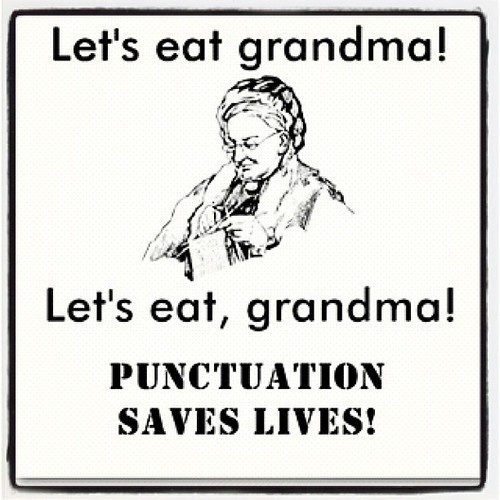 |
| McClure, Darin. "Punctuation Saves Lives" 9/30/2011 via flickr. Attribution 2.0 Generic License. |
Semicolons (page 314)
Everyone always misuses semicolons, or at least knows they will, and rewrites theirs sentences to avoid having to use one. Yes, everyone. But now I'm going to do that a little less often, because I read a short chapter on how to use them. I learned that they should never be used in addition to a conjunction, like "or," "and," or "but." However, if those conjunctions are missing, one can add a semicolon instead, so long as the connection between the clauses is clear enough; however, a conjunction would be better if they are not.
Quotation marks (page 326)
A couple of interesting points I've already used are: Words used as words in a sentence (referring to the word itself, not using the word's meaning in the sentence) should go inside quotation marks, like in the semicolon paragraph I wrote; also, punctuation almost always goes inside of the quotation marks, again, like in the last paragraph.
End punctuation (page 333)
I had always rewritten a sentence when I ended one with an abbreviation that had a period in it, like p.m. But now I know that it's OK, and that I just have to treat it like a normal period. I also didn't know that it's possible to ask a question and use a period instead of a question mark. It just needs to a formally constructed one like "Would you please stop that." It still seems weird, so I don't think I'll use that one much, but it's cool to know.
Reflection:
I peer-edited Katherine's and Sam's rough drafts.
I found the first instance of a long quote that could be set off by indentation in Katherine's draft. I suggested that she look at the rules for writer page on it for herself, because ultimately it's her decision what to do; I just offered my advice that it should:
“There’s a saying that if you come home from vacation and your front door is unlocked and your couch cushions are askew and the lamp is tilted a little and you go into your bedroom and find your jewelry’s gone, the Chinese were there. If you come home from vacation, your door’s locked and nothing’s moved and you go into your bedroom and your safe is still locked but you open it and your jewelry’s stolen, the Russians were there.”
Also, it's important that this was in sort of a gray-zone, where either way could work (it wasn't too short, nor was it too long). It's not necessary to indent long-ish quotes, and this one is only sort of long.
The following examples are from Sam's draft.
"...is up 50%”, meaning..." In this example, I corrected the punctuation that was outside of the quotation marks. It's not something that everyone knows, and I'm sure I'll see it a lot throughout my life now that I know.
"...that 'two-thirds of big companies surveyed' had..." this example shows that he knows what's what when it comes to the necessity of punctuation when the quote fits into the grammatical structure of the sentence: there is no necessity for punctuation.
No comments:
Post a Comment